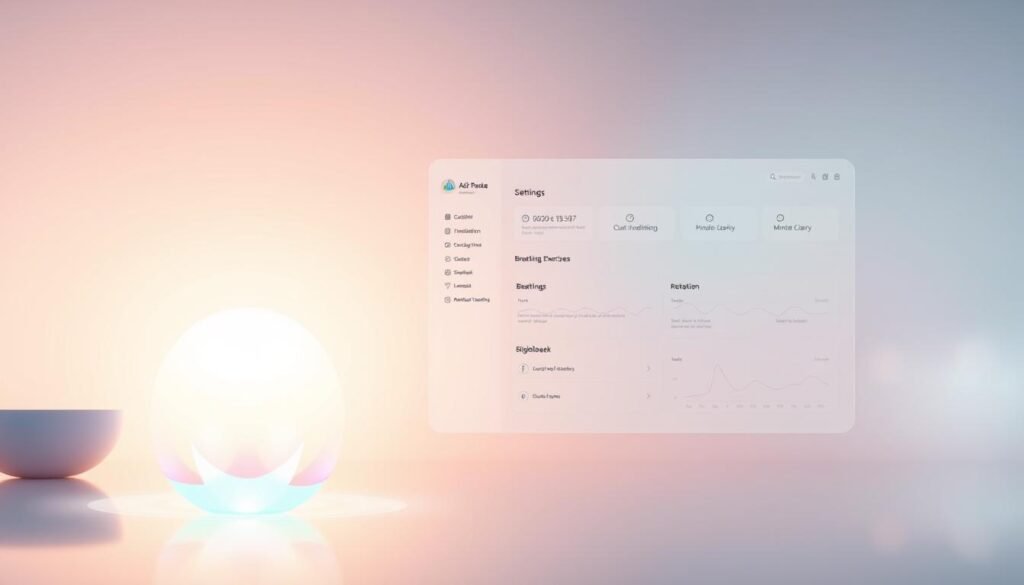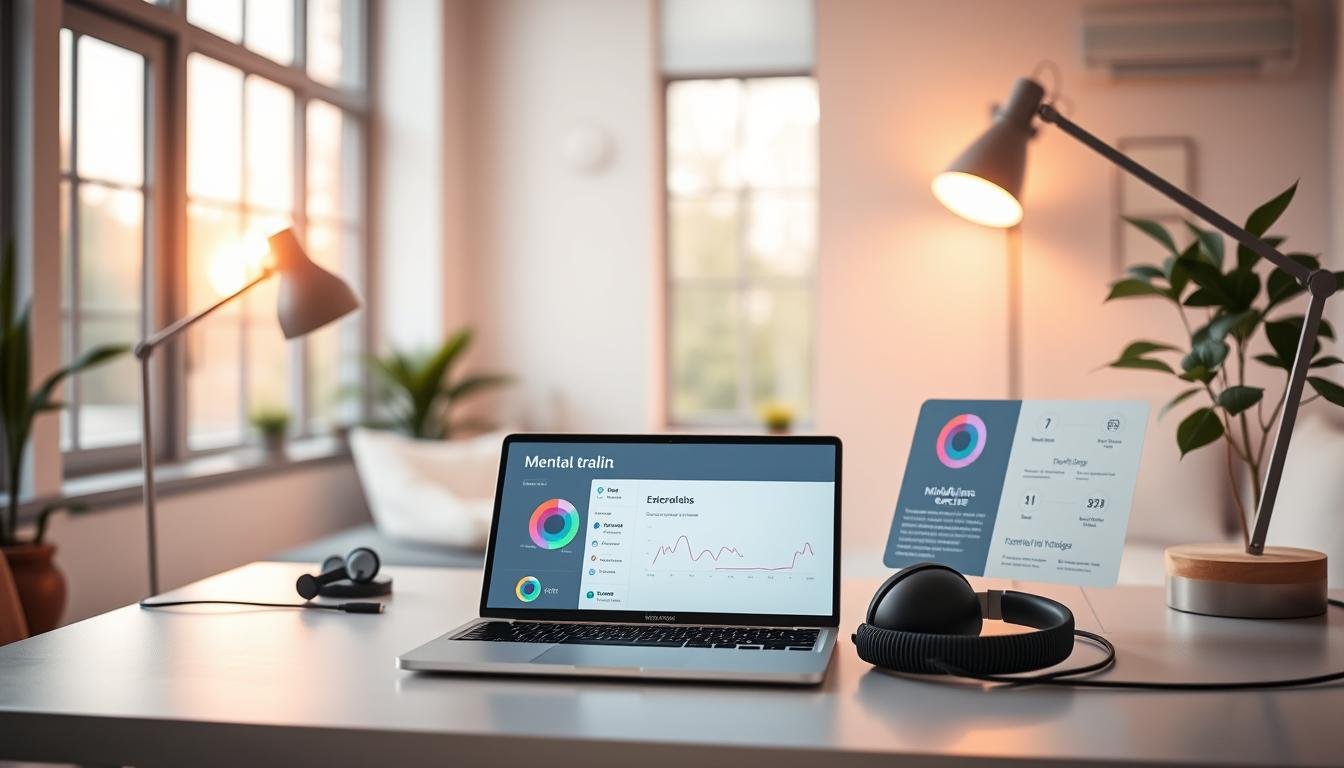Discover the Benefits of AI-Powered Meditation
In today’s fast-paced world, stress has become a constant companion for many. According to a 2021 Gallup survey, 41% of adults worldwide experience a lot of stress. With the pressures of modern life, finding effective ways to manage stress is crucial for maintaining good mental health and overall well-being.
Meditation has long been recognized as a powerful tool for reducing stress and improving mindfulness. The rise of AI-powered meditation is making this practice more accessible and personalized, helping individuals incorporate meditation into their busy lives.
By leveraging technology and intelligence, AI-powered meditation offers a tailored approach to improving health and enhancing life quality. This innovative approach is revolutionizing traditional meditation practices, making them more effective for users.
Key Takeaways
- AI-powered meditation is a growing field that offers personalized stress management.
- Effective stress management is crucial in today’s fast-paced world.
- Meditation can significantly improve mental health and well-being.
- AI technology makes meditation more accessible and tailored to individual needs.
- Incorporating meditation into daily life can enhance overall quality of life.
The Evolution of Meditation in the Digital Age
The meditation landscape has undergone a significant transformation with the advent of digital technology. Over the past decade, technological innovations have revolutionized traditional meditation practices, making them more accessible and personalized.
Modern Stress and the Need for Accessible Mindfulness
In today’s fast-paced world, stress has become an integral part of daily life. The need for mindfulness and meditation has never been more pressing. Meditation apps have emerged as a solution, offering guided meditations, breathing exercises, and sleep stories that cater to diverse needs. These apps have made mindfulness practices more accessible to a wider audience.
| Feature | Traditional Meditation | Digital Meditation |
|---|---|---|
| Accessibility | Limited by location and time | Accessible anywhere, anytime |
| Personalization | One-size-fits-all approach | Customizable based on user preferences |
| Guidance | Dependent on in-person instructors | Offers guided sessions through various media |
How Technology is Transforming Traditional Meditation Practices
Technology has transformed traditional meditation practices in various ways. Wearable technology and biofeedback have enhanced meditation experiences, providing users with valuable insights into their progress. The integration of audio technology, such as binaural beats and spatial sound, has deepened meditation experiences. These advancements have made meditation more appealing to tech-savvy generations.
As technology continues to evolve, it is likely that meditation practices will become even more sophisticated, paving the way for the next evolution in meditation technology: artificial intelligence.
Understanding Artificial Intelligence Meditation Guide
The integration of artificial intelligence in meditation practices is revolutionizing the way we approach mindfulness. As we explore the capabilities of AI in enhancing meditation, it becomes clear that this technology is not just a tool, but a catalyst for a more personalized and effective mindfulness practice.
What Makes AI-Powered Meditation Different
AI-powered meditation differs significantly from traditional meditation practices due to its ability to analyze user data and preferences. By leveraging machine learning algorithms, AI systems can identify patterns in user behavior, such as the time of day they prefer to meditate or the type of meditation they usually practice. For instance, if a user frequently listens to stress-relief meditations in the evening, the AI can suggest similar sessions at that time of day, making the meditation practice more personalized and effective.

Some apps even integrate data from wearables, like heart rate or sleep patterns, to tailor recommendations more precisely. This integration of biometric data allows for a more nuanced understanding of the user’s health and well-being, enabling AI to provide guidance that is physiologically optimized.
The Science Behind AI and Mindfulness
The science behind AI-powered meditation is rooted in the ability of machine learning algorithms to process vast amounts of data to understand user preferences and meditation habits. Studies have shown that mindfulness practices, when guided by AI, can lead to significant improvements in both mental and physical health. For example, research has demonstrated that AI-guided meditation can result in reduced stress levels, improved focus, and enhanced overall well-being.
| Benefits | Description |
|---|---|
| Personalization | AI analyzes user behavior to provide tailored meditation sessions. |
| Effectiveness | AI-guided meditation has been shown to reduce stress and improve focus. |
| Physiological Optimization | Integration of biometric data from wearables for more precise guidance. |
By understanding the neuroscience behind effective meditation and incorporating psychological principles into AI meditation algorithms, these systems can address specific mental health needs, providing a more holistic approach to mindfulness.
Key Benefits of AI-Enhanced Meditation
AI-driven meditation tools are making mindfulness more accessible than ever. The integration of artificial intelligence in meditation apps has opened up new avenues for users to practice mindfulness, making it a part of their daily routine. With the ability to offer personalized meditation experiences, these tools are revolutionizing the way we approach mindfulness.
Personalized Meditation Experiences
AI-powered meditation apps can tailor sessions based on a user’s specific needs and preferences. By analyzing user data, these apps can suggest meditation sessions that are most relevant to the individual’s goals, whether it’s reducing stress, improving focus, or enhancing overall well-being. For instance, a user can have a short mindfulness session wherever they have 10 minutes to relax, and all they need is their smartphone and an app.
Adaptive Sessions Based on User Feedback
The adaptive nature of AI-driven meditation tools allows them to adjust sessions based on user feedback. This means that as a user progresses in their meditation practice, the app can modify the content and duration of sessions to keep the practice engaging and challenging. The ability to save or download favorite meditations ensures that users have calming content available anytime, making it easier to maintain a consistent practice.
Accessibility and Convenience Factors
One of the most significant advantages of AI-enhanced meditation is its accessibility. With an AI meditation guide available 24/7, users can meditate anywhere, anytime, without the need for special equipment or environments. This convenience factor is crucial in making mindfulness a sustainable daily habit rather than an occasional practice. For example, offline access is a must for users who want to meditate anywhere, even when they don’t have an internet connection.
| Feature | Benefit |
|---|---|
| Personalized Meditation | Tailored sessions based on user needs and preferences |
| Adaptive Sessions | Adjusts based on user feedback for a more effective practice |
| Accessibility | Meditate anywhere, anytime without special equipment |
| Offline Access | Allows meditation without an internet connection |
“The mind is everything; what you think, you become.”

Popular AI Meditation Tools and Applications
The rise of AI-powered meditation tools is transforming the way we approach mindfulness, making it more accessible and effective. These innovative applications are designed to provide users with a more personalized and engaging experience.
AI Chatbots for Guided Meditation
AI chatbots are being used to offer guided meditation sessions, providing users with a more interactive and immersive experience. These chatbots can respond to user input, creating a tailored meditation practice that adapts to individual needs. For example, Wysa is an AI-powered chatbot that uses conversational language to guide users through meditation exercises.
Personalized Meditation Recommendation Platforms
AI-driven platforms can analyze user data to provide personalized meditation recommendations. By considering factors such as user behavior, stress levels, and goals, these platforms can suggest tailored meditation sessions to enhance the user’s mindfulness practice. For instance, Calm uses AI to recommend meditation sessions based on user preferences and listening history.
AI-Generated Meditation Content
AI algorithms can generate meditation content, such as guided meditations, music, and nature sounds, to create a more diverse and engaging user experience. This content can be tailored to specific user needs, such as stress reduction or sleep improvement. For example, Headspace uses AI to generate personalized meditation sessions based on user goals and progress.
Smart Meditation Assistants and Wearable Integration
AI-powered meditation tools can integrate with wearable devices, such as smartwatches and fitness trackers, to provide a more comprehensive mindfulness experience. By leveraging biometric data, such as heart rate variability, these tools can offer insights into user progress and provide personalized recommendations. For instance, Fitbit integrates with various meditation apps to provide guided sessions and track user progress.
By leveraging AI technology, meditation tools and applications are becoming increasingly sophisticated, offering users a more personalized and effective mindfulness experience. As these tools continue to evolve, we can expect to see even more innovative features and integrations that enhance the meditation practice.
How to Get Started with AI-Powered Meditation
Embarking on an AI-powered meditation journey can be both exciting and overwhelming, but with the right guidance, you can easily integrate mindfulness into your daily life. As you begin, it’s essential to understand the steps involved in making the most of this technology.
Choosing the Right AI Meditation Tool for Your Needs
With numerous AI meditation tools available, selecting the one that best suits your needs is crucial. Consider factors such as user interface, available meditation techniques, and compatibility with your devices. Look for tools that offer personalized experiences based on your goals and preferences. Some popular options include AI chatbots for guided meditation, personalized recommendation platforms, and smart meditation assistants.

Setting Up Your Personalized Meditation Profile
Once you’ve chosen an AI meditation tool, setting up your profile is the next step. This typically involves answering a few questions about your meditation goals, experience level, and preferred meditation style. The AI will then use this information to create a tailored meditation plan. Be prepared to provide details about your schedule and stress levels to help the AI provide more effective reminders and guidance.
Integrating AI Meditation into Your Daily Routine
To get the most out of AI-powered meditation, it’s essential to integrate it into your daily routine. Identify optimal times for meditation based on your energy levels and schedule. Use AI features like smart reminders to stay on track. Start with short sessions and gradually increase the duration as you become more comfortable with the practice. By incorporating AI-guided meditation into your daily routine, you can experience the benefits of mindfulness even on the busiest of days.
Conclusion: Embracing the Future of Mindfulness
AI-powered meditation represents a natural evolution in the pursuit of mindfulness, offering a more personalized and accessible experience. By integrating artificial intelligence with traditional meditation techniques, users can now enjoy a tailored approach to mental wellness.
The transformative potential of AI-powered meditation lies in its ability to make mindfulness practices more accessible, personalized, and effective. This is achieved through various features such as adaptive sessions based on user feedback, personalized meditation recommendations, and AI-generated content.
It’s essential to recognize that embracing technological tools for mindfulness doesn’t contradict the ancient wisdom behind meditation but rather makes it more relevant in our digital age. Maintaining a balance between technological assistance and personal awareness is crucial for a fulfilling meditation practice.
As AI meditation tools continue to evolve, we can expect advancements such as brain-computer interfaces and deeper personalization. This evolution encourages users to explore AI-powered meditation with an open mind, understanding that finding the right tools and techniques is a personal journey.
Ultimately, while AI can enhance the meditation experience, the fundamental benefits come from the practice itself and the commitment to regular mindfulness. By embracing AI-powered meditation, users can look forward to a more clarity-focused and fulfilling mindfulness practice.
## FAQ
### Q: What is AI-Powered Meditation?
A: AI-Powered Meditation uses machine learning algorithms to create a personalized meditation experience, adapting to the user’s needs and responses.
### Q: How does AI Meditation differ from traditional meditation practices?
A: AI Meditation differs from traditional meditation practices by providing a tailored experience based on user data, whereas traditional meditation often follows a one-size-fits-all approach.
### Q: Can AI Meditation apps replace human meditation teachers?
A: While AI Meditation apps can provide effective guidance, they are not intended to replace human meditation teachers, but rather supplement their teachings and offer accessible mindfulness practices.
### Q: How do AI Meditation tools adapt to individual users?
A: AI Meditation tools adapt to individual users by analyzing their feedback, adjusting the duration, tone, and content of meditation sessions to suit their needs and preferences.
### Q: Are AI Meditation apps suitable for beginners?
A: Yes, AI Meditation apps are suitable for beginners, as they provide a gentle and guided introduction to meditation, helping users establish a consistent practice.
### Q: Can I use AI Meditation with wearable devices?
A: Yes, many AI Meditation tools integrate with wearable devices, allowing users to track their progress, receive reminders, and access guided meditations on-the-go.
Share this content:




Post Comment